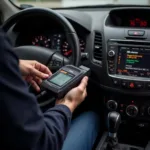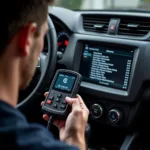Choosing the right truck and car diagnostic tool can feel like navigating a maze. With countless options flooding the market, it’s easy to get lost in technical jargon and overwhelming features. This comprehensive guide will equip you with the knowledge to make an informed decision, whether you’re a seasoned mechanic or a car enthusiast.
Understanding the Importance of Car and Truck Diagnostic Tools
Gone are the days of relying solely on mechanical expertise to diagnose vehicle issues. Modern vehicles are complex machines with intricate electronic systems. A car and truck diagnostic tool acts as your window into these systems, providing valuable data to pinpoint and troubleshoot problems efficiently.
Types of Diagnostic Tools: Finding Your Perfect Match
1. Code Readers: Your First Line of Defense
Code readers are entry-level tools designed to read and clear basic diagnostic trouble codes (DTCs). They’re ideal for DIYers and car owners who want to understand the “check engine” light.
2. OBD-II Scanners: Deeper Insights for Enhanced Diagnostics
OBD-II scanners offer a step up from basic code readers. They provide access to live data streams, allowing you to monitor engine parameters, sensor readings, and more. This real-time information enables more accurate diagnoses.
3. Professional-Grade Scan Tools: The Mechanic’s Arsenal
For professional mechanics and workshops, car truck diagnostic tool offer comprehensive functionality. These advanced tools can perform complex tasks like module coding, bi-directional control, and advanced programming.
Key Features to Consider: Making an Informed Choice
1. Vehicle Compatibility: Ensuring a Seamless Fit
Not all diagnostic tools are created equal when it comes to vehicle compatibility. Before making a purchase, verify that the tool supports the make, model, and year of your vehicle.
2. Software Updates: Staying Ahead of the Curve
The automotive industry is constantly evolving. Opt for a tool that offers regular software updates to ensure compatibility with the latest vehicle models and technologies.
3. User Interface: Navigating with Ease
A user-friendly interface can significantly enhance your diagnostic experience. Look for tools with intuitive menus, clear displays, and easy-to-understand data presentation.
4. Data Logging and Reporting: Tracking and Analyzing Performance
The ability to log data and generate reports is crucial for tracking vehicle performance and identifying intermittent issues. Some tools even allow you to export data for further analysis.
Expert Insight: Choosing the Right Tool for the Job
“Investing in the right diagnostic tool for cars and trucks is essential for any serious mechanic,” says John Miller, a veteran automotive technician with over 20 years of experience. “It’s not just about reading codes; it’s about understanding the story behind those codes and having the tools to fix the problem effectively.”
Conclusion: Empowering Your Automotive Journey
Selecting the right truck and car diagnostic tool empowers you to take control of your vehicle’s health. By understanding the different types of tools, key features, and your specific needs, you can confidently diagnose and troubleshoot issues, saving time and money in the long run. Whether you’re a DIY enthusiast or a seasoned professional, the right diagnostic tool can be an invaluable asset in your automotive journey.

